


VOL. III NO. 2 REG NO. L5015 DELHI, THURSDAY SEPTEMBER 21, 1944.
PATROL EFFECTS JUNCTION BETWEEN MYITKYINA, CHINA
By JOHN ANDREW United Press Correspondent
MYITKYINA - A composite Chinese-American patrol of Gen. Joseph W. Stilwell's North Burma troops returned here this week after effecting a junction with elements of the 20th Army of Gen. Wei Li Huang's Salween Expeditionary Force somewhere along the Burma-China border.
It was the first time land-locked China was connected with its Allies by an overland route, except for the Tibetan mule trail, for more than 30 months.
(This expedition was a survey to evaluate the feasibility of extending the Ledo Road from Myitkyina east to China over extremely rugged mountain terrain, rather than continuing from Myitkyina south to Bhamo thence to the Burma Road. Juncture of the two forces by the party does not necessarily mean that a road due eastward has been judged practicable. It may have, but we'll let you - and the Japs - guess - The Editor.)
Word of the meeting was flashed by a party of Army Signal Corps
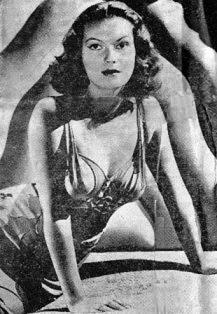 Says the caption material - and who's gonna argue? - that MGM's Hazel Brooks has been chosen by serviceman as the
girl they'd like to dream about. Well, good night, fellows.
Says the caption material - and who's gonna argue? - that MGM's Hazel Brooks has been chosen by serviceman as the
girl they'd like to dream about. Well, good night, fellows.
|
The North Burma troops did not meet any Japs on the trail during their three-week trek through the jungle. A sizable force of Lt. Gen. Sun Li Jen's veteran 38th Chinese Division made the round trip with the American service forces.
First American to enter China was Sgt. Elton Henning, former Pathe News cameraman who recorded the trip for the Army Signal Corps. Henning related how an unidentified seven-year-old Kachin boy, whose parents had been killed by the Japs, wandered into camp one night and was fed and cared for by the G.I.'s until they reached the safety of a village.
Henning's party was commanded by Sgt. William L. Howard. Others in the group were Cpl. Frederick Heimrick, Pvt. Luther B. Jones, Sgt. Wayne Shearer, Robert Kugelman (rank not given) and Sgt. Vito Chairappa.
The family honors of the trip, however, undoubtedly belonged to the Taylor brothers, Sgt. Bill and Pvt. Charley. They made the trip together after more than a year's service in the Army in the CBI.
It was originally planned that the party be supplied by air-dropping. But since the group was mostly walking on mountains submerged by clouds the pilots were often unable to find the dropping points.
"Some drops did get through," said Maj. John H. Lattin. "The first drop to land was mostly spinach. Since the terrain was mostly covered with greens, we wanted to save a can to throw in the Quartermaster's face, but his name was redeemed when we got some canned chicken."
The party returned with jungle sores caused by leeches. Both Chinese and Americans were treated on the trip by Capt. William King, of the Medical Corps, who also was busy aiding Kachins suffering from infection from Jap-inflicted bullet wounds.
After the troops herded the last stubborn mule across the Irrawaddy, they were marched to the parade ground here and dismissed.
After the dismissal, a quartet of Sgt. John Garlewsky, Sgt. Orliet Rogers and the Taylor brothers entertained with their version of Why Don't We Do This More Often?
NO SUPREMO IN PACIFIC
QUEBEC - (ANS-UP) - The conference between President Roosevelt and Prime Minister Winston Churchill was concluded this week, and the principals announced that they had reached decisions on all points for final victory over Nazi Germany and "the destruction of the barbarians of the Pacific."
Roosevelt and Churchill emphasized jointly that insofar as the Pacific was concerned, their greatest problem would be the most effective employment of the overwhelming forces which would be freed after the European war was over.
|
SULTAN, MERRILL WASHINGTON - (UP-ANS) - The Senate this week confirmed the nomination of Maj. Gen. Dan I. Sultan, CBI
President Roosevelt recommended promotion to temporary lieutenant general of Maj. Gen. Lucian K. Truscott, Jr. |
Roosevelt was emphatic in stating that the question of a supreme commander in the Pacific had not been considered at the conference. He pointed out that the tremendous distances separating the arenas of action made
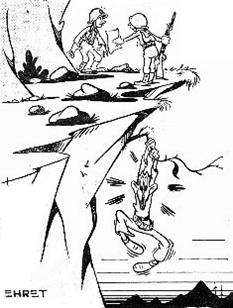 "WILL YOU SIGN THIS REQUISITION FOR 20 FEET OF ROPE, SIR?"
"WILL YOU SIGN THIS REQUISITION FOR 20 FEET OF ROPE, SIR?"
|
Churchill affirmed the intentions of the British to do their full share in defeating Japan. The Prime Minister said that one of the few points that had to be adjusted at the conference was the attitude of "some representatives" to keep the Pacific war too much for U.S. "You can't have all the good things to yourself, you must share," Churchill said, grinning. He remarked that it was easy for him to reach an understanding with Roosevelt, because of their long association and personal contacts.
The President said that the outstanding fact of the conference was that it had taken less time, produced less argument, and ended in more complete agreement than any of the earlier meetings. He warned that major actions in the Pacific were complicated by problems of logistics as well as strategy and pointed out that while plenty of men and material are available, it is still a task to bring them to the scene of action.
Concerning the European war, the president said that he and Churchill were not yet ready to name a specific date for Germany's final downfall.
Chinese reaction to the Quebec conferences, as reported from Chungking, were to the effect that although China was not represented at the conferences, the Chinese Armies and people must continue to fight strongly against present and future Japanese encroachments.
36th NOW ON MOVE SOUTHWARD
The 36th British Division of Maj. Gen. Francis W. Festing advanced along the railroad south from Hopin towards Katha this week in the face of limited enemy opposition and in the midst of monsoon rain and mud. Only patrol activity was reported with no main contact with the enemy.
The Arakan was quiet after last week's flare-up. There was patrol activity south of Maungdaw.
The Fifth Indian Division crossed the Manipur and is now on the south bank. The Fifth crossed in the face of formidable Jap defenses, but the Nips didn't attempt much resistance and their fire was light.
Elements of the 14th Army operating across the Chindwin continued to chase remnants of the Japanese 15th and 31st Divisions eastward. Hundreds of bodies of dead Japs were found, most of them victims of starvation.
Only patrol action was reported by the Chinese around Kazu.
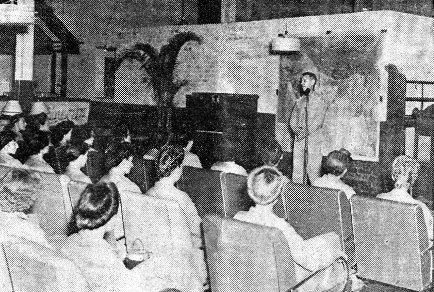 Hospitality plus. Maj. Gen. George E. Stratemeyer personally welcomes the newly-arrived members of the Women's
Army Corps to the China-Burma-India Theater.
Hospitality plus. Maj. Gen. George E. Stratemeyer personally welcomes the newly-arrived members of the Women's
Army Corps to the China-Burma-India Theater.
|
They say there's nothing like a woman's touch. You'll get no argument on that score from Maj. Gen. George E. Stratemeyer's Eastern Air Command and AAF Headquarters. A detachment of WAC's have sustained that claim already in little less than two months of duty with Stratemeyer's command.
After a brief but thorough period of indoctrination, which included lectures on the security, health, geography, organization and inter-relationship of the various Allied forces fighting in CBI, the WAC's were assigned to administrative positions in AAF and ASC Headquarters. The women soldiers have fitted admirably into the complicated office routine. During the period of indoctrination, the WAC detachment was taken on a tour of Calcutta to familiarize the women with principal points of interest and facilities which would be at their disposal during off-duty hours.
The Red Cross-conducted tour lasted four hours. First stop was the beautiful Government House, residence of the Governor of Bengal. Next, the WAC's visited the Nimtalla Burning Ghat. Finally, they were conducted to the Jain Temple dedicated to the God Pareshnath or Shiva, the God of Destruction. The temple was built in 1867 by Rai Badridas Bahadur Mookim, court jeweler to the Viceroy and is one of the most elaborate and richly ornamented structures in India.
With typical American adaptability, the WAC's have already made themselves perfectly at home, thousands of miles away from the sheltering shores of Shangri-La. According to reports, they are performing their varied duties so eagerly, industriously and capably that the powers that be have asked for additional WAC personnel.
First lady G.I.'s to arrive for duty in the Theater came last year to work for Southeast Asia Command HQ, then in Delhi, now in Ceylon. The present contingent is the first unit to serve with the CBI Theater.
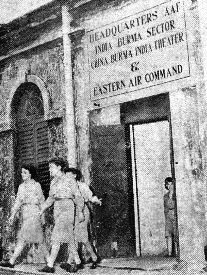 Sgt. Jean Forrest, left, and Sgt. Beth Franklin walk out of main HQ entrance.
Sgt. Jean Forrest, left, and Sgt. Beth Franklin walk out of main HQ entrance.
|
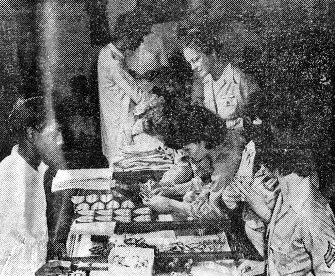 "Must" was the Post Tailor Shop, where CBI and AAF shoulder patches were bought. WAC's Forrest, Berger, Jean, Higgins,
Brassus, left to right.
"Must" was the Post Tailor Shop, where CBI and AAF shoulder patches were bought. WAC's Forrest, Berger, Jean, Higgins,
Brassus, left to right.
|
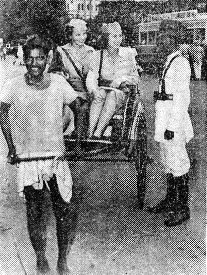 Pvt. Dorothy Luft, Pfc. Margaret Solum ask directions from Calcutta policeman.
Pvt. Dorothy Luft, Pfc. Margaret Solum ask directions from Calcutta policeman.
|
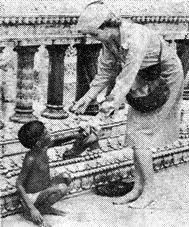 Pvt. Dorothy Luft redeems her shoes at temple for a half anna.
Pvt. Dorothy Luft redeems her shoes at temple for a half anna.
|
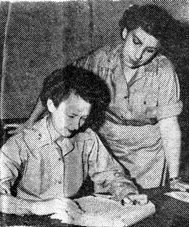 CO Capt. Mary Eliod, Lt. Roslyn Katz inspect company records.
CO Capt. Mary Eliod, Lt. Roslyn Katz inspect company records.
|
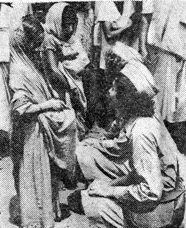 WAC's Forrest, Franklin exchange fashion notes with Indian girls.
WAC's Forrest, Franklin exchange fashion notes with Indian girls.
|
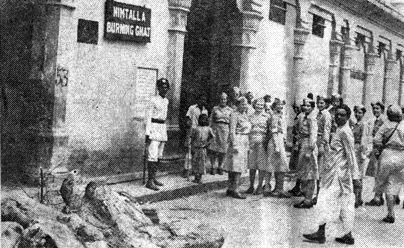 One of the stops on the WAC's indoctrination tour was the Nimtalla Burning Ghat on the bank of the coffee-colored
Hooghly River.
One of the stops on the WAC's indoctrination tour was the Nimtalla Burning Ghat on the bank of the coffee-colored
Hooghly River.
|
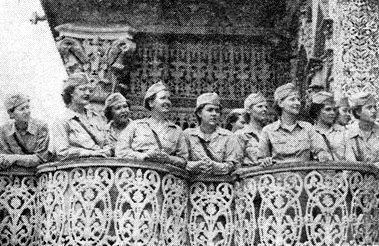 WAC's Stevenson, Wright, Schaefer, Robertson, Nugent, Luft, Nash, Phillips, Whitaker, Solum, Goodwin look down from
temple balcony.
WAC's Stevenson, Wright, Schaefer, Robertson, Nugent, Luft, Nash, Phillips, Whitaker, Solum, Goodwin look down from
temple balcony.
|
Battle Of Tengchung Described
By ALBERT RAVENDALE United Press correspondent
TENGCHUNG, WITH CHINESE EXPEDITIONARY FORCES - (Delayed) - Chinese forces, inching from one battered house to the next within the walled city of Tengchung, are painfully rooting out the enemy who, though surrounded and partly decimated, is determined to hold this key to the opening of the Burma-Ledo Road. The Japanese still are fighting doggedly in spite of weeks of incessant artillery bombardment and aerial bombings and strafing.
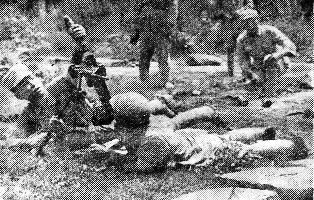 Chinese soldiers lob mortar shells into the walled city of Tengchung during the siege of the town.
Chinese soldiers lob mortar shells into the walled city of Tengchung during the siege of the town.
|
The battle inside Tengchung has become a battle for streets, or the battered remains of what once were streets, for temples, houses and for mud-brick walls. The Chinese measure each day's gains in a few yards and sometimes fight for days for possession of the wall of a single building in which Japanese units are holding out, although Tengchung has absorbed literally hundreds of tons of artillery and mortar shells and smaller ammunition.
TERRIFIC COURAGE
The Japanese live underground in deep dugouts in which they hide from the blast of American bombs and Chinese artillery. The only enemy troops above ground are those who man the forward pillboxes, the fortified houses and walls.
Frequently the Chinese who attempt to storm forward are mowed down, but those remaining regroup and storm the Japanese positions again and again. Of one company which began the Salween campaign, only the company commander remains.
Chinese artillerymen have taken their American 75 howitzers apart and have carried them over Tengchung's walls to fire point-blank at less than 100 yards range into the mouths of the Japanese pillboxes.
VENDORS ACTIVE
I stumbled through the shattered remains of one section of the city held by the Chinese, while Chinese soldiers guarding the alleys leading to their front units laughed when I ducked at the sound of Japanese rifle bullets plopping into walls close overhead. They yelled to their comrades, "See that American. He's afraid."
I found that Chinese homes and shops had collapsed like domino stacks from the concussion of Chinese artillery. In one north corner of the city, only blackened walls remained where United States airplanes had dropped fire bombs containing oil. The streets where the Chinese drove the enemy out block by block are a maze of trenches and pillboxes, at times constructed from ancient sewers, mud bricks and huge paving slabs torn from the street and from tables taken from the wreckage of homes near the entrance arch.
Chinese vendors sold soldiers sweet meats and dry Yunnanese wheat cakes at exorbitant prices while artillery shells whistled directly overhead. Only a few old women and children remained of the city's once prosperous inhabitants.
At the main southwest gate a once stately statue of Yunnan's Governor, Lung Yun, was minus a leg and an arm.
I found an American Liaison Team in the courtyard of a Chinese merchant's house. As I talked with them, a Chinese lieutenant was carried in - the right side of his face and one arm badly burned. He explained he had been directing an inexperienced group of Chinese flame thrower operators in an attempt to eliminate a Japanese pillbox 30 yards away. The Chinese soldiers, hurriedly trained to replace a team killed three days before, lost control of the flame thrower and instead of burning out the Japanese, spread searing red flames of oil over the Chinese position, burning six Chinese soldiers to crisp death. The lieutenant considered himself lucky to have escaped with his life.
Of Tengchung itself, I found that little remained. American bombers, Chinese artillery and Chinese engineers have blown the great stone wall to bits in places. I was told that some Chinese shopkeepers had sneaked back into the city under shell fire to salvage their remaining belongings before the Chinese soldiers carried them off together with captured enemy booty.
On Lai Feng Shan, a mountain one mile southwest of the city the Temple of Lai Feng Tazu still stands among hemlock trees overlooking the smoking city inside I found a long-gowned Buddhist monk wandering dazedly about examining the remains and gathering up ornaments knocked from niches in the walls. An artillery shell had torn through the roof and shattered one 16-foot-high solemn-faced god. Bits of straw and wood dangled from the stumps where the god's left clay arm had been ripped off.
BROKEN BACK NOT ENOUGH TO GROUND SERGEANT
TENTH A.F. HQ., INDIA - Even a broken back wasn't enough to keep T/Sgt. Robert L. Barnes, 20-year-old 10th USAAF crewman, out of combat.
Barnes, a radio operator and gunner with a squadron of the Seventh Bombardment Group, was serving in a B-24 that returned to its base badly shot up after an encounter with the Japs. With two engines on fire, the pilot, Lt. Charles E. Mead, made a belly landing at night. For all except Barnes, the landing was good.
The sergeant spent three months in bed, in a cast, and two months more recuperating after the cast was removed. When he was ready to go back on duty, he was offered ground service and turned it down. Said he would rather fly combat and is.
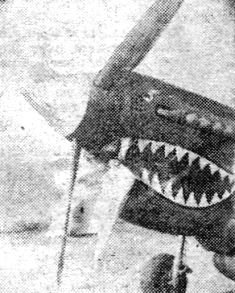 That P-40 Warhawk is just as mad as it looks. Apparently peeved at the interloping P-51 Mustangs, this Warhawk
chewed a chunk out of a Mustang wing. It really happened (claims 14th Air Force) during an air raid alarm when the two
planes collided when rolling to the dispersal area. Hummmm, could be.
That P-40 Warhawk is just as mad as it looks. Apparently peeved at the interloping P-51 Mustangs, this Warhawk
chewed a chunk out of a Mustang wing. It really happened (claims 14th Air Force) during an air raid alarm when the two
planes collided when rolling to the dispersal area. Hummmm, could be.
|
JAP SHIPPING JOLTED
BY 14TH AIR FORCE
FOURTEENTH AIR FORCE HQS., CHINA - Japanese shipping took another terrific jolt this week from 14th Air Force B-24's, which destroyed three freighters in the Formosa Straits, while P-40's bombed and strafed steamers and river junks off Luichow Peninsula and in French Indo-China.
In a single day's operation, Liberators destroyed over 10,000 tons of enemy shipping off Formosa and Warhawk fighter-bombers accounted for at least 20 junks near Luichow and four river steamers in Indo-China's Red River.
Other fighters and medium bombers of the Chinese-American Composite Wing, meantime, concentrated on enemy communications and troop compounds in the Hengyang-Lingling sector and Jap columns thrusting towards Kweilin.
LINGLING IN FLAMES
Lingling was reported to be in flames after almost continuous bombing and strafing by B-25's, P-40's and P-51's and considerable damage was done to the railroad center at Tunganhsein, west of Lingling.
Enemy compounds and buildings in the Youngfeng area, northwest of Hengyang, were bombed and large fires from camouflaged open stores and several secondary explosions were observed. Jap supply lines southwest of Hengyang, at Chiehling, were bombed and strafed, as well as large forces of enemy troops, causing many casualties.
ENEMY STALLED
Enemy columns advancing on Kweilin, while not halted, were stalled somewhat by the almost constant fighter and bomber acting of the 14th. Jap air opposition was active in this area and several Oscars and Zeros were downed.
On the Canton front, where a new Jap offensive is underway, several large fires were started at Samshui by Mitchell bombers and P-40's, inflicting considerable damage.
Nip air defenses in the Salween sector continued to be heavy this week, and B-25's, which blasted installations at Lungling, were met by several formations of enemy fighters. P-40's strafed and bombed the Burma Road, destroying at least 40 Jap vehicles.
From all these missions, one of our aircraft was reported lost.
He Set 'Em Up On Next Alley
BURMA FRONT - In a raid into the heart of Jap-held Burma, a small formation of bombers from the hard-hitting "Earthquaker" Group destroyed two spans of the vital Mu River Bridge, seriously disrupting enemy rail communications between Mandalay and the Manipur front.
The Japs knew that someone would be after that important target and had built a by-pass bridge further south. Lt. Charles R. Lord, bombardier whose motto is "set 'em up on the next alley." had other ideas . . . and in two raids knocked out both bridges.
LOOKING 'EM OVER
A concerted movement seems to be afoot to put a representative of men serving in this war at the peace table. The idea has a great deal of merit. No group of individuals has a better right to determine the punishment of the enemy than the men who faced him in battle.
"Although there are many military men we can think of who would realistically represent the men and women in uniform, our personal choice is Gen. Joseph W. Stilwell.
"Gen. Stilwell has seen more front line combat than any other top-ranking officer in this war. He has suffered the humiliation of defeat and the joy of victories. He has eaten, slept and fought beside his men. He has tossed back a fanatical enemy, though handicapped by lack of men and material.
"Through it all, Gen. Stilwell has maintained his humor, his clear perspective and his demands for efficiency. In our books, Uncle Joe is a soldier's soldier." - Army Times, Aug. 19, 1944
Amen, sirs.
A trip to Myitkyina and beyond impresses you with the sense of reality that exists there. The G.I.'s in Burma know that they are on the way to opening the land route to China, because they can see the actual results, smell the dead Nips and hear shots fired in anger. You feel as if the honest ones actually are sorry for the Queensway Commandos. War is hardly a picnic when you're in it but can be awfully bad, too, when you are detached and buried in paperwork. We don't mean it's fun to get shot at, live precariously in fox holes and wonder where in hell your next chow will come from. All you guys at the front can write in and call us a liar if you want to. It's your privilege.
TREND OF THE TIMES: Army News Service announces that a movie based on the career of Lt. Gen. George S. Patton, Jr., currently leading the American Third Army into Germany, will be made in the near future.
Is it true, gentle readers, that you are interested in demobilization or would you rather spend the rest of your days in OD? On the presumption that a certain minority would like to return to the rocking chair, the bottle of bourbon and the tweed coat, let's look into this demobilization business as outlined by the War Department last week.
According to the War Department, the end of the European conflict will mean that 2,000,000 G.I.'s will be demobilized. How does this affect YOU?
Frankly, there are yet too many "and's, if's and but's" to say for dead certain. However, two of the four requirements will certainly apply to a large slice of CBI personnel - months overseas and total time in the service since Sept. 16, 1940. The other two factors to be taken into consideration in a point system not yet fully determined are dependent children under 18 (up to three) and combat decorations.
All we know is what we read in the papers, but it looks as though a lot of us would be eligible. Now don't start packing your barracks bag. If and when this demobilization comes, those lucky G.I.'s will have to wait for replacements and for the Army to run through the usual administrative squirrel cage commonly known as "red tape." It will take time, but we can now see a friendly light on the horizon.
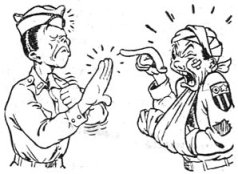
|
BUT NOT VICTIM
ADVANCED FIGHTER BASE, BURMA - Fighter-bomber pilot Jack F. Starkey roared off the runway, flew a mile after his engine died and crashed in the jungle.
Forty-five minutes later, he returned to the base, uninjured and unscratched.
Meanwhile, a rescue party of five men hurried into the jungle to give aid. The group came out several hours later with two suffering injuries requiring hospital care and the other three severely scratched and bruised.
In Burma it is sometimes better to be the victim than be members of a rescue squad.
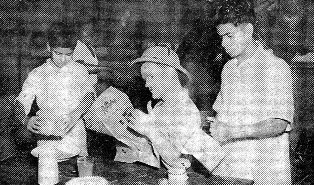
Burrah Sahib Cracks the Whip |
COOK CREATES HIS OWN SHANGRI-LA
ALONG THE LEDO ROAD - "Don't know how I'm going to manage when I get back in civilian life." Sahib John F. Cassiday - Rank: corporal; Profession: officers' mess sergeant - sighed as Boy No.1 poured his coffee and Boy No.2 carefully portioned the cream and sugar and stirred it briskly.
"But don't you ever work?" asked the Roundup correspondent, out to get a story on the life of an officers' mess non-com on the Ledo Road.
"Work!" Sahib Cassiday was horrified. "What do you think I spent two months training these Garos for?" he asked, encompassing Boys No.1, 2, 3, 4, and 5 in a casual gesture. Boy No.4, flipping flapjacks at the stove with all the skill of a veteran Coney Island griddle man, grinned broadly.
"When I came up to this hole five months ago to take over the officers mess, they gave me five jibbering garos and said that was my staff." Sahib Cassiday said. "I trained them to cook, even to bake. And I got some local KP's to help them keep the kitchen clean."
"Don't you have any labor trouble?" Sahib Cassiday was asked.
"No. I tell my boys, come the end of the war I'll take them back to Santa Cruz, Calif., with me. There they get lots of kana, plenty of rupees, thousands of shapely bebies to cuddle. Now they'd work for nothing."
"In fact," Sahib Cassiday laughed, "it might not be a bad idea to take 'em back. Sure would save me a lot of trouble trying to train my wife."
14th A.F.'s Historian 'Went To Mountains'
Here's the story of a CBI captain who, even as Mohammed, went to the mountain when the mountain didn't come to him. He is Robert B. Hotz, of the 14th Air Force, who wasn't getting the action he wanted in Washington, so prevailed upon Maj. Gen. Claire L. Chennault to add him to his outfit.
His eagerness took him on combat missions and into a couple of hazardous events.
The chain of circumstances began in 1943 when Chennault was called Stateside for a conference in Washington. Hotz had just completed the drafts on his book, Chennault's Tigers, telling the story of the famous AVG. Chennault was impressed by the Captain, then assigned to Air Transport Command, and it didn't take much talking on Hotz's part to convince the greatest Tiger of them all that he would be well qualified to write the history of the 14th Air Force.
Before heading for China, the Captain found his way to Florida and a berth in the gunnery school at Tyndall
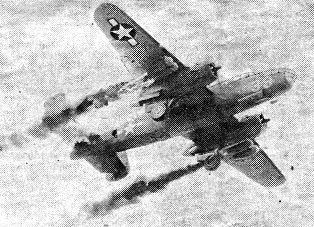 As this B-25 soars into the air, smoke and spurts of flame stream out from the rockets beneath the wings. The rockets
are being used successfully to get heavily-laden planes into the air, but will probably not be used tactically.
As this B-25 soars into the air, smoke and spurts of flame stream out from the rockets beneath the wings. The rockets
are being used successfully to get heavily-laden planes into the air, but will probably not be used tactically.
|
Upon jumping The Hump, Hotz was assigned to A-2, charged with preparation of the chronological story of the exploits of the 14th - from the undermanned, sketchily-supplied China Air Task Force to the present formidable organization.
At this point begins the counterpart of the Muslim legend. The action didn't come to Hotz, so Hotz went to the action.
His first rough shuffle came on a B-25 mission to Indo-China. While over enemy territory, an ack-ack battery disabled the plane's pilot. Hotz was in the middle compartment of the ship at the time and the navigator-bomber noting that the captain was wearing a leather flying jacket, guessed he was a pilot. A hurried call brought Hotz to the cockpit, where he took over the controls of the faltering bomber and brought it out of enemy-occupied territory on instrument conditions. The pilot recovered sufficiently by this time to land the disabled aircraft at a friendly field.
Reporters who heard the story after the escape discovered that Hotz was a pre-war "Sunday pilot" while a staff member of the Milwaukee Journal. He had never flown an Army bomber, much less a wounded Mitchell out of control while under enemy attack. Hotz was awarded the Air Medal for his performance.
The captain was soon flying missions again.
It took him 12 days to walk back.
"We went out at 14,000 feet in the midst of a heavy cumulus so thick we couldn't see the ground," Hotz reported. "It took forever to get down - 15 minutes by the clock. I had given up hope of terra firma when I went crashing into a tree.
"I landed in a rugged mountain country where the people couldn't read or write and sniped at each other with flintlock rifles. They were little squat guys with turbans and long black hair."
Most histories aren't written from personal experiences. The history of the 14th Air Force will be a play-by-play account direct from the sidelines and on the field.
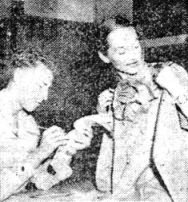
Goes to the Wars |
LADY CORRESPONDENT
The lady pictured to your right is one of the newest additions to the corps of war correspondents in CBI, Miss Eleanor draper, representing the Agence Francaise de Presse, same being the Fighting French News Agency. The G.I. who is trying to look as though he is really interested in adding up the sales slip is T/5 Edward F. Graber. Miss Draper seems to be trying on a G.I. shirt, which, we hear, she is planning to take to Myitkyina one of these days. Then Myitkyina Commandos get all the breaks.
Miss Draper, who comes to CBI after having seen action in Australia and Africa, is an artist and photographer, as well as a reporter. She is an Australian.
Miss Draper is the fourth lady correspondent now in the Theater, the others being Annalee Jacoby, of Time and Life , Margaret L. Durdin, of the same publications, and Alice R. Hager, of Skyways magazine.
10th A.F. Band Plays For Orphan Tots
TENTH A.F. HQ., INDIA - G.I.'s are always looking for entertainment, but musicians in the famous Seventh Bombardment Group of the 10th Air Force, EAC, recently demonstrated they could also dish it out when a worthy occasion arose. Indian orphans were given a taste of American entertainment recently when airmen returning from missions, mechanics coming in from a hard day on the line and clerks finishing
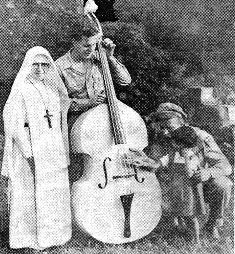 Indian orphan Myrtle Nanson, two and a half years old, shyly examines a bass viola, as Lt. Don Nelson, dance band
director, points to the strings and Pfc. Thomas Glynn holds the instrument. Mother Ame is a member of the Catholic
missionary group entertained by the G.I. band.
Indian orphan Myrtle Nanson, two and a half years old, shyly examines a bass viola, as Lt. Don Nelson, dance band
director, points to the strings and Pfc. Thomas Glynn holds the instrument. Mother Ame is a member of the Catholic
missionary group entertained by the G.I. band.
|
It was the first time most of the tots had seen American band instruments and they sat through the program in rapt attention.
The orphans, all girls in a home organized by Catholic missionaries more than 35 years ago, crowded into their small playroom to hear the Army Air Force musicians render such numbers as Stomping at the Savoy and Easy to Remember.
With the exception of a few British children, all of the youngsters are dark-skinned Indians. Looking out from their home over the high brick fence around the place, they had often seen American soldiers racing back and forth in trucks and jeeps, but this was the first time that they had a close-up acquaintance with their Allies from the other side of the world. And they enjoyed every moment of the program, a hundred little ones following the soldier-musicians to the gates of the orphanage when the men left.
Pfc. Edward A. Kowalski was particularly proud of this occasion, because the band stands he had built in his tent out of scrap wood and painted with insignia of the Seventh Bomb Group were being used for the first time. Although organized 14 months ago the band had been forced to use makeshift stands until Kowalski went to work with hammer and nails.
Other problems that confront the volunteer band overseas in India are these: Sharp changes in weather warp reeds and mouthpieces, widely scattered members must be rounded up for rehearsals and performances via jeeps, trucks, bicycles or what have you, and outside performances are subject to unusual blow-ups by India's erratic weather. Lt. Don E. Taylor, director and sax player, avers that on occasion the band members were forced to struggle with a piano to keep it from being swept off the stage during a monsoon storm.
An Indian radio station near the air base was the scene recently of the first broadcast half-hour of the Seventh Bomb Group band. Regular broadcasts over this station have been arranged.
G. A. R. OF CBI - LAND
HEADQUARTERS, EASTERN AIR COMMAND - Three master sergeants in a U.S. Bomb Group, part of the Third Tactical Air Force, have 85 years service in the Army among them.
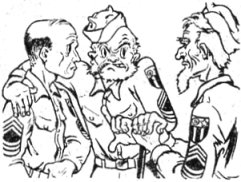
|
The wearers of the yards of hash marks are M/Sgts. William Hopkins, 54, Mike Jamrak, 53, and Hubert F. Sage, 49. Hopkins has been in the Army 26 years, Jamrak 30 years and Sage 29 years.
Hopkins saw service in France during the last war, later served in Panama, Hawaii, the Philippines and China. This time around, he has fought in Egypt, North Africa, Sicily, Italy and now Burma. In China, in 1923, he was in the 18th Infantry Regiment under then Lt. Col. George C. Marshall and later had as his regimental executive officer Lt. Col. Dwight D. Eisenhower.
Jamrak saw 22 months of fighting in France in 1917-18 with the Third Infantry Division, followed by nearly continuous service at overseas stations. he was transferred to the Air Corps in 1932. Because of his age, he had to receive special permission from the Adjutant General to come overseas in the present war.
Sage also served under Eisenhower when the latter was a captain and under Gen. H. H. Arnold, then a colonel. During the last war he was stationed in the Philippines. He has two sons in the Air Corps and a son-in-law in the Ordnance Department.
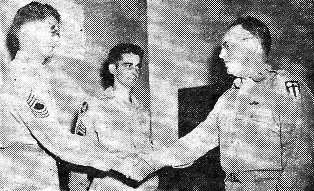
Rewarded for Keeping "em Flying. |
BRONZE STARS FOR ASC G.I.'S
BALTONTIN, LEFTWICH CITED FOR KEEPING 'EM FLYING
AIR SERVICE COMMAND, INDIA - Two G.I.'s of the CBI Air Service Command have been awarded the Bronze Star for the great success with which they have been able to "Keep 'em flying."
The men, S/Sgt. Harold Baltontin, of San Francisco, and M/Sgt. Richard H. Leftwich, of Burden, Kans., received the stars from Maj. Gen. T. J. Hanley, Jr., at a formal ceremony before officers of Hanley's staff.
Baltontin received his medal as a result of having designed an apparatus to be installed in transport planes which permits the load in "food drops" to be discharged twice as fast as formerly. Precious seconds saved over the target come in very handy as any flak-happy food kicker will gladly tell you. Baltontin has also designed revisions in medium bomber construction, making them more adaptable to combat conditions in CBI.
Leftwich, 24, got his medal as a result of his skill in charting manning tables and distribution of personnel to maintain efficiency at its peak in the forward areas and in China. Leftwich has been in the Army two and a half years and in CBI two. He has two other brothers in the Army and he himself is waiting for Old Man Rotation to tag him.
TENGCHUNG CAPTURED
Fall of Tengchung, with virtual extermination of the Jap garrison, estimated by the Chinese High Command at 3,000, was the highlight of the week on the Salween Front.
Tengchung, 35 miles from the Burma border, and 30 miles northwest of the Burma Road city of Lungling, was a mass of rubble when the Chinese 20th Army, with the American liaison group of Brig. Gen. Frank Dorn's Y-Forces, took over. Members of Dorn's staff directed artillery fire on Jap positions from tiny liaison planes and bombers from the 14th and 10th USAAF completed the virtual leveling of the city.
50 PRISONERS
The Chinese are still hunting down remnants of the small Jap group which fled the city before its downfall. Only 50 prisoners were taken, including 15 women.
Reuters announced from Chungking that the Chinese had occupied Lungling in their Salween offensive. The Japs are said to be falling back on the Burma Road near the Burma border.
Some of the Japs were without food for four days before the final push by the Chinese against the temples and compounds in one corner of the city where the Nips had elected to make their last stand. The Chinese knew that the end was near when they began to find Jap suicides, and a Nip officer surrendered with a small body of men.
USED FLAME THROWERS
In instances where the Japs refused to surrender, but cowered in their holes, the Chinese poured gasoline down on top of them then deluged the interior with flame throwers. The Chinese captured 50 heavy and light machine guns, 800 rifles, 15 artillery pieces and heavy mortars, seven radio sets, 14 trucks, clothing and medical supplies. The Chinese laid down an artillery barrage on enemy positions at Mangshih, while planes of the 10th USAAF scored direct hits on a Jap supply dump there.
Mae Willis Brown
SHE'S THE TOAST OF KUNMING
By S/SGT. EDGAR LAYTHA Roundup Staff Writer
You've eaten better chow than at Kunming Air Base. They seem to serve the same dish with very little variations all the time. So often you go into town. Fortunately, Kunming is an excellent place to eat. Famous Chinese cooks, refugees from Sahnghai, and Finch cooks, fugitives from Indo-China, cater for G.I.'s in the city. But the champ is Mrs. Mae Brown, an American lady who helps run the Chinese-owned Hotel de Commerce.
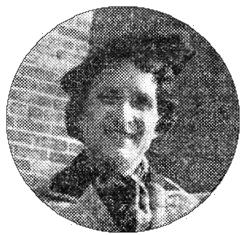
|
She is a cocktail of Mae West and Grace Fields. She dresses for the boys every night, be it officers' or enlisted men's night. This alternating pass system works very well in Kunming. Over her evening gown, Mae wears a dark blue theater cape. Rich costume jewelry matches the color of the dress, while the whole figure swims in an invisible cloud of heavy perfume. Mae has to dress every night, for if she doesn't the men will ask: "But Mae, what's the matter tonight?"
The men of Kunming like to be petted by the middle-aged but still radiant American woman. There is a hometown atmosphere about her. Mae's elegance is not Fifth Avenue, but a homely, pleasant mail-order chic. Why she is what she is and what she does so well Mae tells best in her own cute way with the intonation the other Mae used to say: "Come up and see me sometime." Here it is:
"My name is Mrs. Mae Willis Brown, but my boys call me Brownie Mae. I am a civilian, but my heart belongs to the Army. I, too, have seen very rough weather. Now I am the place where the boys can dump their troubles. Age makes no difference at all in this hotel. The bombardiers come from their missions, and I read for them, play the accordion for them. I arrange their parties, go to all their dances, run a gift shop and have all sorts of things made for them. I am a living liaison office. I interpret China, for I have lived here over 20 years. I struggled with the Chinese through famine, flood, revolution, war. At Woohu my husband ran a base hospital for the British and American Yangtze Flotillas. I have been a missionary, an emergency nurse, I have spent six months on the Burma Road during the Jap Blitz and I saw Chungking burn. Now I like to tell the men about China. Interpretation is all, food is secondary . . . but, mind you, my beefsteaks are famous. Do you know what they say to Me? 'We do the bombing, Brownie, and you do the beefsteaks.' And . . . some write on their bombs: 'Take it away for Brownie Mae.'
'IT'S A GENTLEMAN'S EATING PLACE'
"It is a privilege to eat in this hotel, not a business proposition. This place is not a cheap joint where you blow in for a sandwich and blow out. It isn't a dive, it isn't a brothel. It's a gentleman's eating place. It is a good clean place to bring your girl. We do not allow drunkenness and rowdiness. Most of the G.I.'s carry my guest cards. Occasionally, a boy gets fresh and I say to him, 'Pardon me, you have mistaken the place,' and I ask for his guest card, which carries his name and serial number.
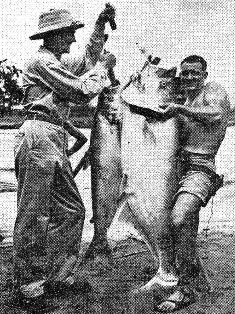 The biggest one, of course, got away, but among those caught on a fishing expedition up the Indaw Gye Chung near
Kamaing were these two. The largest measures almost six feet, weighed 160 pounds. Left, Capt. K. S. Laney; right,
S/Sgt. R. E. Stephens, the Izaak Waltons.
The biggest one, of course, got away, but among those caught on a fishing expedition up the Indaw Gye Chung near
Kamaing were these two. The largest measures almost six feet, weighed 160 pounds. Left, Capt. K. S. Laney; right,
S/Sgt. R. E. Stephens, the Izaak Waltons.
|
"You should have attended our big holiday meals. Christmas was lovely, but Easter was choice . . ."
The men of Kunming still rave about Mae Brown's fabulous Easter breakfast.
One hundred and fifty soldiers, all attending by special invitation, dived into the lush big morning meal. They had: fresh orange juice, ham and eggs, French-fried and brown hashed potatoes, country sausages, ham steak and chips, broiled fish with rice, hot cakes and syrup and a heap of fancy Easter pastry. The color scheme for the feast was green and yellow. Green and yellow Easter eggs in green and yellow baskets. A Chaplain read an Easter story. Mother Brown and the crowd sang for two hours, first Easter songs, then a hit parade. When it was all over, every G.I. reached for his wallet and surfaced a Chinese $1,000 bill. Five bucks to you.
Mae's magical kitchen made a permanent habit of such pleasant gatherings. There is, for instance, the Ducky Daddle Club of which Mae is honorary president. The traditional menu of the club is tomato soup roast duck with chestnut dressing, candied sweet potatoes, vegetable salad, peach cobbler, coffee and roasted peanuts.
KUNMING CROSSROADS OF CBI
These culinary pleasures may sound somewhat fancy, but food and G.I. shows are virtually the only relaxation the men have in China's backyard. And it is an old American custom to recreate home in distant lands. The American soldier carries America with him wherever he goes. We would have Coca Cola fountains in the deepest jungles if we could do it. Kunming is the great crossroads of CBI. For transients from the line, an American woman like Mae and all what she offers is even more indispensable than for the permanent compliments. Some of the boys don't like her guest card system. They want to pay and be served for it. They see that the hotel is doing a whale of a business and figure that Mae must have her share in it. But they will have to take Mae's share as a compliment to her merits.
Brownie Mae's name, like that of the corpulent White Lady of Durban who sings the Star Spangled Banner for our troopships passing Africa, has transcended theater limits. I spoke to a guy who came to China via Africa. He happened to meet a CBI lad going home. CBI spoke to him thus wise: "First place you will hit in China will be Kunming. Here is a card to Brownie Mae's."
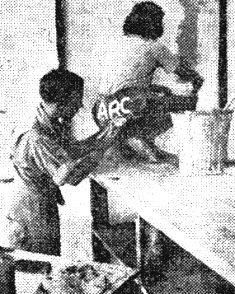 While Miss Nancy Hemingway, comely Red Cross worker toiled with her paint brush, Sgt. Fred
Costa couldn't resist
the temptation to do a little painting in a lighter vein. Miss Hemingway and Kostka were among a host of workers
who volunteered their services in painting and doing a hundred other odd jobs needed to complete a Red Cross Club at
an ATC base.
While Miss Nancy Hemingway, comely Red Cross worker toiled with her paint brush, Sgt. Fred
Costa couldn't resist
the temptation to do a little painting in a lighter vein. Miss Hemingway and Kostka were among a host of workers
who volunteered their services in painting and doing a hundred other odd jobs needed to complete a Red Cross Club at
an ATC base.
|
Railroad Lines Take Beating In E.G.. Raids
Communications lines and centers were the targets upon which EAC aircraft concentrated this week as fighter-bombers, mediums and heavies of the 10th Strategic and Tactical Air Forces laid their bombs on railroad tracks, stations, freight yards and shipping throughout and off the Burma coast.
B-25's of the 10th continued their action on the Salween front where they combined with the 14th in aiding the Salween forces in their drive to open up the Burma Road. The 10th bombers destroyed a bridge at Hsenwi on the Burma Road, and caused a large explosion in the fuel storage area at Chefang.
KATHA HIT
The same aircraft also bombed Katha, towards which the 36th Division id hitting. Three large fires were observed in the town, with smoke rising to 3,000 feet. P-47's and P-51's of the 10th followed the bombers along the Salween and fired the warehouse at Mangshih, besides sweeping over Tengchung before its fall and also strafing the Nip garrison at Lungling.
The Thunderbolts also attacked targets along the Mandalay-Myitkyina Railroad. In the Tiddim Road area, fighter-bombers of the Tactical Air Force lent direct support to the 14th Army by hitting enemy troop concentrations, rolling stock and river craft. The planes were also active in the Kabaw Valley and along the Chindwin River.
JAIL DESTROYED
Mitchells hit Mangmih, Wanling and Nampha; then surprised the Nips by destroying the town jail at Bhamo. The railroad bridge at Kyaukse and the important Mu River by-pass bridge also took a beating.
Liberators attacked the railroad station at Maymyo, inflicting severe damage to the station, adjacent buildings and rolling stock. The station at Moulmein was also the target for the heavies, good results being shown.
Beaufighters of the Tactical Air Force beached or left burning seven vessels ranging from 50 to 500 tons east of Kalegauk Island. Another 300 foot merchant ship was left severely damaged. The Beaufighters also had their usual runs against locomotives, rolling stock and river craft in Central and Southern Burma.
Japanese Forces Drive Steadily Towards Chinese Base Of Kweilin
The Japanese forces in China were driving steadily ahead this week, with Kweilin, American air base in Kwangsi Province, the immediate objective.
Chinese spokesmen in Chungking estimated the enemy was using 45,000 troops divided into three columns. At last reports, the Japs were less than 50 miles from Kweilin, according to an Army News Service report from the Chinese capital. Chungking spokesmen were quoted as saying they could hold the city.
In the meantime, the 14th USAAF announced it was abandoning and destroying its airbases near Kweilin. One strip only is being preserved for forward fighter operations. American personnel, supplies and equipment have been evacuated to auxiliary bases in southeastern China.
Hengyang, which has been operating as a supply base for the Japs and was the starting out point for their drive towards Kweilin, received some unmerciful bombing from Liberators of the 14th and the city is virtually gutted.
As the Japs progressed in their drive to open a direct line between Manchuria and Singapore, it was reported they were massing more troops in Indo-China. The Nips now have possession of two-thirds of Chekiang Province on the coast and have occupied Wenchow, which was one of the two remaining seaports in Chinese hands. Foochow is now the only seaport the Chinese control.
The Japs announced over Tokyo radio they had occupied Chekiang Province to forestall Allied strategy. They said it also gave them control of the Straits of Formosa.
JANE FINALLY GIVES ALL
Morale Receives Shot In Eye
There probably aren't a great many G.I.'s in CBI who get to see Jane, the famed British comic-strip chic who is to the BOR's what Male Call is to us . . . only more so.
Jane is a lady, a highly patriotic, comely British lass, who has one affliction, if affliction it be, that is at some odds with her otherwise sterling character. She has just one hell of a time keeping her clothes on.
The lady is, we would judge, in her late 'teens or early twenties. She is soft spoken. She is blonde
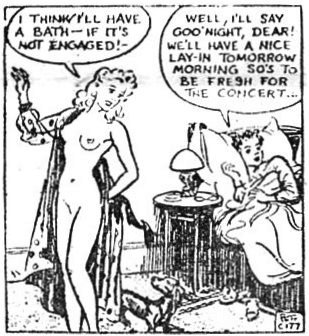
|
We can't tell you all about Jane's past, because we came in somewhere after she had embarked on her duration career, same career being one long series of jumbled, implausible adventures throughout which Jane is continuously undressing, being undressed, having her clothes blown off, all with the utmost aplomb and poise, while thousands leer.
We first became acutely conscious of Jane about six months ago when the proximity of British units led to an exchange of cigarettes and reading matter. We got gypped on the cigarettes which the British freely admitted, as will anyone who has ever smoked a "V" (The British position was that while they didn't mind the residual parts of a horse being rolled into cigarettes, it wasn't fair to leave the harness in the mix.) But we did get the best of the deal on the comic strips, which we freely admit. We will swap you two L'il Abners or 20 Orphan Annies for one Jane any day in the week.
When we first met her, Jane was having a struggle with a character dubiously named Michael Boloney. Mr. Boloney had, through a set of machinations which we never quite understood, framed Jane into a phony marriage. Jane, who smarts up every now and then, was pretty dumb about the marriage deal. Consequently, for some weeks, Bro. Boloney was doing very well for himself and neither Jane, we, or the BOR's knew from one day to the next where Jane's next brassiere was coming from. (We know where they went, but skip it.)
(We better throw in here that Jane's true love is, from time to time, a British flier and, of all things, an American MP. We told you the story was implausible.)
Well, anyway, for several weeks, Boloney was crashing into Jane's bedroom and Jane was throwing him out. Boloney all the time expostulating in a dialect that sounded like something out of Sean O'Casey but made less sense. No one cared much, because as long as we kept Jane in that bedroom, we kept he out of worse trouble and out of those tweeds which occasionally, but rarely, gum up the plot.
Then the next thing, old Jane has made a deal with the security people and she turns up at an RAF base canteen as a K.P. pusher, charged with snooping around and finding someone who has been talking too much.
Does old Jane switch to the long handled undies and thus prolong the war at least three years? Not that cookie! She carries on, stiff upper lip and all that, in about three ounces of silk and, sometimes less.
Which brings us right, and suddenly, to the crux of the matter. Maybe oldsters who have been having this vicarious affair with Jane since, say 1939, will say "pouf" and spin their moustaches, and look worldly.
But us punks, who have only been chasing the gal for a year or so, have inevitably been bothered, nay, even inhibited by one doubt. During the months we have been peering through keyholes and over transoms while Jane bathed, dressed, undressed, went to bed, rose, stretched and ran up an order of scrambled eggs, we have never been quite able to catch her au natural.
Well, sirs, you can go home happy now. Right smack out of the blue, and with no one even threatening her, old Jane peeled a week ago and the 36th Army immediately gained six miles and the British attacked in the Arakan, and Montgomery's men damn near ran right over the Siegfried Line.
Maybe we ought to have Jane, too?
The C.B.I. Roundup is a weekly newspaper of the United States Forces, published by and for the men in China, Burma, and India, from news and pictures supplied by staff members, soldier correspondents, United Press, OWI, and Army News Service. The Roundup is published Thursday of each week and is printed by The Statesman in New Delhi and Calcutta, India. Editorial matter should be sent directly to Capt. Floyd Walter, Hq., U.S.F., I.B.T., New Delhi, India, and should arrive not later than Sunday in order to be included in that week's issue. Pictures must arrive by Saturday and must be negatives or enlargements. Stories should contain full name and organization of sender. Complaints about circulation should be sent directly to Lt. Boyd Sinclair, Hq., U.S.F., I.B.T., New Delhi, India. Units on the mailing list should make notification of any major change in personnel strength or any change of APO.

SEPTEMBER 21, 1944
Original issue of C.B.I. Roundup shared by Ruth Canney, widow of CBI veteran John Canney.
Copyright © 2006 Carl Warren Weidenburner
TOP OF PAGE PRINT THIS PAGE ABOUT THIS PAGE SEND COMMENTS
PREVIOUS ISSUE CLOSE THIS WINDOW NEXT ISSUE
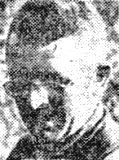 Merrill
Merrill